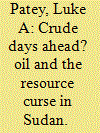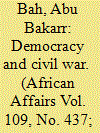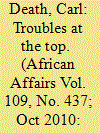|
|
|
Sort Order |
|
|
|
Items / Page
|
|
|
|
|
|
|
| Srl | Item |
| 1 |
ID:
099193


|
|
|
|
|
| Publication |
2010.
|
| Summary/Abstract |
Oil remains a major threat to peace and stability in Sudan as the interim period of the Comprehensive Peace Agreement draws to a close. With a 2011 referendum for Southern secession on the near horizon, political relations between the government of Sudan and the semi-autonomous government of Southern Sudan rest precariously on a fragile economy and waning oil sector. This analysis of the political economy of oil in Sudan since 2005 finds that governance at national, regional, and local levels has largely failed to manage the damaging political and economic effects of the resource curse. Uncertainty surrounding Khartoum's oil transfers to the South, negligence and corruption among the Southern elite, and the lack of a peace dividend to offset environmental degradation in oil-bearing regions trace the multiplicity of the resource curse in Sudan. While compromises on oil between political elites offer some hope of avoiding a future North-South civil war, the regional and local dimensions of the resource curse remain critical sources of armed conflict.
|
|
|
|
|
|
|
|
|
|
|
|
|
|
|
|
| 2 |
ID:
099192


|
|
|
|
|
| Publication |
2010.
|
| Summary/Abstract |
The civil war in Côte d'Ivoire presents unique features with respect to the causes of civil wars and the nature of peace processes in West Africa. It is a conflict largely driven by concrete political and social grievances over citizenship. In addition, it is marked by a significant effort by the belligerents to take ownership of the peace process and negotiate directly. This article traces the civil war to the politicization of citizenship and ethnicity during the democratization process. It argues that the peace agreements engineered by the international community failed to end the conflict largely because they relied heavily on traditional peace formulas and paid insufficient attention to the underlying issue of citizenship. In contrast, the peace agreement forged by Ivorians has been relatively successful because it directly addressed the citizenship issue and restored domestic ownership of the peace process. This article focuses on the peace process and the intrinsic relation between citizenship and progress toward peace in Côte d'Ivoire. In addition, it connects the discourse on democracy in Africa with the salient issue of citizenship and underscores the fluidity of citizenship and democracy in African politics.
|
|
|
|
|
|
|
|
|
|
|
|
|
|
|
|
| 3 |
ID:
099188


|
|
|
|
|
| Publication |
2010.
|
| Summary/Abstract |
This article analyses the impact of elections and particularly their administration on Nigeria's democratization process. It argues that elections under the Fourth Republic (1999-2007) were characterized by ineffective administration at all stages and levels (before, during and after), resulting in damagingly discredited outcomes. This was due in large part to the weak institutionalization of the primary agencies of electoral administration, particularly the Independent National Electoral Commission (INEC) and the political parties. INEC lacks both institutional and administrative autonomy, as manifested by its composition and funding by the presidency, as well as its gross lack of professionalism and security of tenure for its officials. Elections can only engender the consolidation of democracy in Nigeria if the electoral processes are reformed in ways that fundamentally address the autonomy and capability of INEC and related electoral agencies, particularly political parties, to discharge their responsibilities effectively. The recent trend towards challenging electoral fraud in the courts, however, does signal a strengthening of the rule of law and gives some reason for optimism.
|
|
|
|
|
|
|
|
|
|
|
|
|
|
|
|
| 4 |
ID:
099191


|
|
|
|
|
| Publication |
2010.
|
| Summary/Abstract |
Increasingly, scholarship on urban Africa has focused on the social construction of place in informal neighbourhoods. In this approach, researchers often highlight the fluidity, contingency, or creativity of the urban poor majority. Efforts to remake planning processes to work with or be driven by these informal everyday place-making strategies can be quite inspiring. Yet I question whether these ideas as put into practice in cities can be anything more than survival strategies of the abject poor. Historical-geographical roots and social relations with the state make each informal neighbourhood a particular case, and these factors have significant influence on people's capacity to make new, alternative statements with their urban places, or to create alternatives that might be replicated. This essay is based mainly around fieldwork in 2006-8 in Zanzibar's peri-urban West District shehia (locations) of Mwera and Welezo, including assessment of the built environments, interviews, archival work, and participant observation. I document ways in which these neighbourhoods are, despite newness, rooted in history and geography, and how residents' peri-urban everyday place making depends upon their relationships with the state. The internal heterogeneity of place making and social positioning proves difficult to contend with or deploy for alternative planning.
|
|
|
|
|
|
|
|
|
|
|
|
|
|
|
|
| 5 |
ID:
099190


|
|
|
|
|
| Publication |
2010.
|
| Summary/Abstract |
Political protests have visibly increased in frequency and intensity in South Africa in recent years, and they seem to indicate a more adversarial relationship between the post-apartheid state and civil society. This article uses the 2002 Johannesburg World Summit on Sustainable Development, and the protests which accompanied it, to illuminate these broader trends. It analyses the legacy of the Summit as a 'mega-event', and highlights the importance of the 'mega-protests' in 2002. The most important effects are shown to be the disruption of South African extraversion; the marginalization and repression of particular social movements; and the exacerbation of broader trends toward a more polarized political landscape in South Africa. Importantly, however, the article concludes that such developments are not evidence of growing distance between the state and civil society, but rather between those considered legitimate and responsible partners, and those who are excluded from 'normal' politics. Thus the Johannesburg Summit illuminates broader trends toward the governmentalization and transnationalization of politics in South Africa, and destabilizes conventional understandings of what and where 'South African politics' actually is, as well as raising important questions regarding the impacts of such mega-events in the future.
|
|
|
|
|
|
|
|
|
|
|
|
|
|
|
|
| 6 |
ID:
099194


|
|
|
|
|
| Publication |
2010.
|
| Summary/Abstract |
Land reform and post-genocide justice and reconciliation are arguably the two most pressing challenges facing Rwanda. Both will only be delivered by collaboration between government, civil society, and international donors. This article explores the realignment of these actors within post-genocide and post-conflict policy-making processes. Rwanda is a hard case for NGOs and civil society, in that both the internal freedoms of democracy and the external support structures that often assist resistance to authoritarian rule are lacking. Further complicating matters, the interplay between the moral legitimacy of the Rwandan government and its material dependence on donors shapes the opportunities and constraints of all policy actors. The article proceeds by profiling the policy context and relevant policy actors; mapping the land reform and gacaca policy processes, and the contribution of two civil society actors, LANDNET and Penal Reform International (PRI), to these processes; and concludes by evaluating the determinants of civil society effectiveness. The core argument is that spaces for civil society engagement in policy processes are ad hoc and personalized, rather than based on institutional relationships between society and the state.
|
|
|
|
|
|
|
|
|
|
|
|
|
|
|
|
|
|
|
|
|